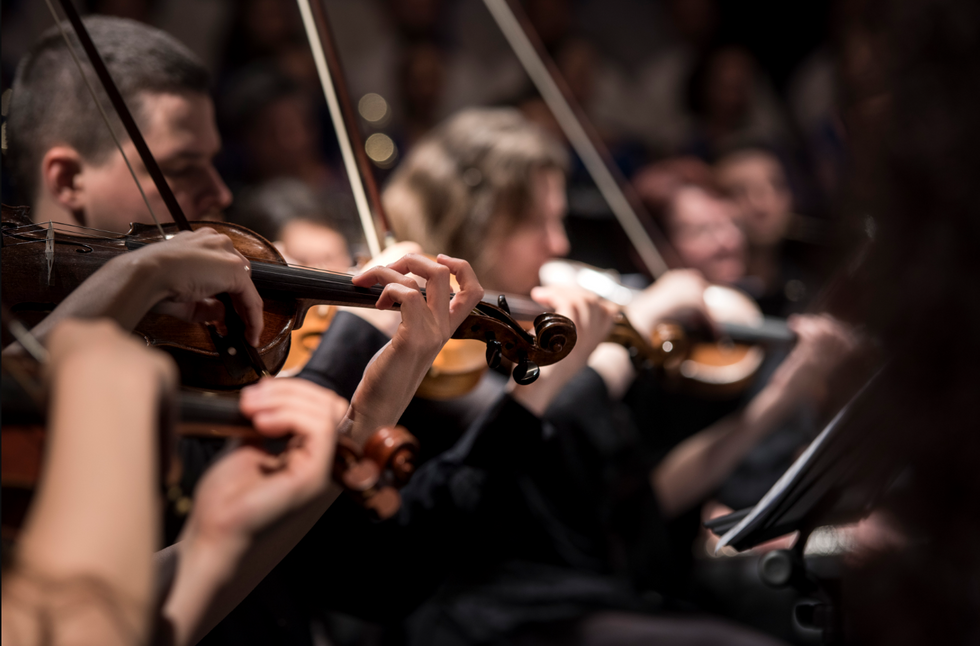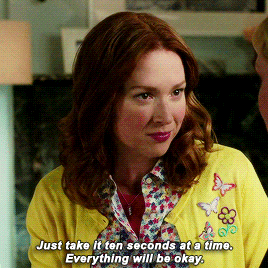Music has always been an important part of my life and I feel like a lot of people can relate to that. When I first picked up an instrument I wasn't a natural, but I was instantly hooked to the possibility of what I could do to be better.
I have always been a perfectionist and things that challenged me would normally discourage me, but I was too inspired by the sound of experienced players who I had the opportunity to hear and meet throughout high school.
By junior year of high school, my heart was set on going to school for music. I wasn't confident in my abilities, but I couldn't think of anything else I would rather do. People wondered why I didn't just go for something I was already naturally good at--my dreams didn't make sense to them-- but as I enter my last year of college, I wouldn't trade the experiences I have gained from being a music major for anything.
Here are 7-ish lessons you learn as a music student:
1. Practice doesn't always make perfect
It doesn't seem fair-- take it from someone who has to work twice as hard to learn music as some of her naturally gifted peers, but practice makes permanent. If you are just playing the notes on the page, over and over again, you are simply memorizing; and that might help you with that particular piece in that moment; but what if your nerves get the best of you in that audition? What if you have to recover after messing up a section and you only understand the music as those notes in a particular order? You are setting yourself up for failure and musicians must be resilient.
I feel like I never truly understood how to practice until I began studying with my current professor. I now think of practicing as a system of setting up obstacles in my playing and making my mind focus in such a way that I am able to play the music no matter what.
2. You have to swallow your pride
If you ever want to grow as a musician, you have to be able to admit mistakes. No one is perfect, if someone comments on your intonation, don't assume they are just trying to ruin your day. Even if you dislike the person who is making the comment, there is most likely truth in what they are saying, so look into it, work on it-- the worst thing that could happen is improvement.
2a. You have to rise above comments that are not constructive
Contrary to the initial point, you have to be able to filter through constructive and not constructive comments. Examples :
Constructive criticism: "Hey, I noticed your rhythms seems a bit consistent in this passage".
Better constructive criticism: "Hey, I noticed your rhythms seems a bit consistent in this passage; I would recommend practicing these specific measures with a metronome".
Not constructive criticism: "Wow, you really suck".
Worse constructive criticism: *gossiping outside of a practice room* "I can't believe (insert name) even passed their audition into the music department. * Don't be this person, go into your own practice room and practice.*
3. There will always be someone better than you
I know this is a harsh concept to grasp, especially for the competitive soul, but somewhere there is someone who has mastered a particular part of their craft and you in comparison are inferior. Don't worry, it's not the end of the world; these people are the ones you should learn from-- ask questions, let them inspire you.
4. All rehearsals are mandatory
If you have the privilege to be part of an ensemble, especially a competitive one; under no circumstances should you skip a rehearsal. It doesn't matter how well you know your music, rehearsal is about putting your part with the entire ensemble's parts and you are screwing over yourself and the rest of the ensemble by not showing up.
5. You won't always see your progress
Some days you will leave the practice room and you will feel like the most inadequate musician in the world; this feeling of mediocrity will sometimes last days. Understand that these ruts are normal, but as long as you're leaving the practice room each day, you're doing everything in your control to fix the problem.
6. Auditions are always stressful
If auditions make you nervous, congratulations-- you are normal! This is also a positive thing, even if it doesn't feel like it at the time, because being nervous about something is an indication that you care about it.
6a. Sometimes you'll have bad auditions
I can't tell you the amount of times that I've gone directly to a practice room to cry in private after an audition or performance. Being a musician makes you vulnerable. Sometimes the mistakes that seem most significant to you, the person judging hardly notices-- however, sometimes you're not just being too hard on yourself.
I have grown from bad auditions because after I would let myself wallow, I would go back into that practice room the next day. If you're lucky enough to speak with the person you auditioned for, you should ask them for their suggestions of what you need to work on.
6b. You will also have good auditions
You worked really hard-- maybe learned from your last audition that didn't go so well-- you made that ensemble; and now you're euphoric. Yes, celebrate your accomplishment, but do not allow yourself to remain stagnant. You need to continue working just as hard as you prepared for that audition because that's the bar you set for yourself when you had that amazing audition!
7. Sometimes you have to take a step back and remember why you do it
Stress tends to test us. Anything worth having will have its challenges and musicianship is no exception, but sometimes you have to take a step back and remember why you pursued music in the first place. Passion for something is one of the few things in life that no one can take from you and that is an incredible thing















 man running in forestPhoto by
man running in forestPhoto by 





 "I thought you knew what you signed up for."
"I thought you knew what you signed up for." man and woman in bathtub
Photo by
man and woman in bathtub
Photo by  four women sitting on black steel bench during daytime
Photo by
four women sitting on black steel bench during daytime
Photo by  Uber app ready to ride on a smartphone.
Photo by
Uber app ready to ride on a smartphone.
Photo by  woman in red tank top and blue denim shorts standing beside woman in black tank top
Photo by
woman in red tank top and blue denim shorts standing beside woman in black tank top
Photo by  blue marker on white printer paper
Photo by
blue marker on white printer paper
Photo by  welcome signage on focus photography
Photo by
welcome signage on focus photography
Photo by  woman in white and black striped long sleeve shirt lying on bed
Photo by
woman in white and black striped long sleeve shirt lying on bed
Photo by  pink pig coin bank on brown wooden table
Photo by
pink pig coin bank on brown wooden table
Photo by  person holding iPhone 6 turned on
Photo by
person holding iPhone 6 turned on
Photo by  person holding pencil near laptop computer
Photo by
person holding pencil near laptop computer
Photo by  person slicing vegetable
Photo by
person slicing vegetable
Photo by 








